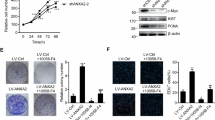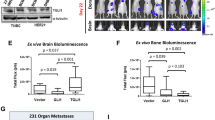Abstract
We have previously reported that astrocyte elevated gene-1 (AEG-1) was upregulated in human breast cancer. However, the biological function of AEG-1 in the development and progression of breast cancer remains to be clarified. In this study, we examined the effect of AEG-1 on cell proliferation and found that AEG-1 upregulation was significantly linked to increased Ki67 (P<0.001). Ectopic expression of AEG-1 in MCF-7 and MDA-MB-435 breast cancer cells dramatically enhanced cell proliferation and their ability of anchorage-independent growth, whereas silencing endogenous AEG-1 with shRNAs inhibited cell proliferation and colony-forming ability of the cells on soft agar. Furthermore, these proliferative effects were significantly associated with decreases of p27Kip1 and p21Cip1 two key cell-cycle inhibitors. Moreover, we further demonstrated that AEG-1 could downregulate the transcriptional activity of FOXO1 by inducing its phosphorylation through the PI3K/Akt signaling pathway. These observations were further confirmed in clinical human primary breast cancer specimens, in which high-level expression of AEG-1 was inversely correlated with the expression of FOXO1. Taken together, our results provide the first demonstration of a novel mechanism by which AEG-1 induces proliferation of breast cancer cell, and our findings suggest that AEG-1 might play an important role in tumorigenesis of breast cancer.
This is a preview of subscription content, access via your institution
Access options
Subscribe to this journal
Receive 50 print issues and online access
$259.00 per year
only $5.18 per issue
Buy this article
- Purchase on Springer Link
- Instant access to full article PDF
Prices may be subject to local taxes which are calculated during checkout






Similar content being viewed by others
References
Arden KC . (2007). FoxOs in tumor suppression and stem cell maintenance. Cell 128: 235–237.
Ash SC, Yang DQ, Britt DE . (2008). LYRIC/AEG-1 overexpression modulates BCCIPalpha protein levels in prostate tumor cells. Biochem Biophys Res Commun 371: 333–338.
Brown DM, Ruoslahti E . (2004). Metadherin, a cell surface protein in breast tumors that mediates lung metastasis. Cancer Cell 5: 365–374.
Brunet A, Bonni A, Zigmond MJ, Lin MZ, Juo J, Hu LS et al. (1999). Akt promotes cell survival by phosphorylating and inhibiting a forkhead transcription factor. Cell 96: 857–868.
Cardozo T, Pagano M . (2004). The SCF ubiquitin ligase: insights into a molecular mechanism. Nat Rev Mol Cell Biol 5: 739–753.
Dijkers PF, Medema RH, Pals C, Banerji L, Thomas NS, Lam EW et al. (2000). Forkhead transcription factor FKHR-L1 modulates cytokine-dependent transcriptional regulation of p27 (KIP1). Mol Cell Biol 20: 9138–9148.
Doerfler W, Hohlweg U, Müller K, Remus R, Heller H, Hertz J . (2001). Foreign DNA integration perturbations of the genome—oncogenesis. Ann NY Acad Sci 945: 276–288.
Dong XY, Chen C, Sun X, Guo P, Vessella RL, Wang RX et al. (2006). FOXO1A is a candidate for the 13q14 tumor suppressor gene inhibiting androgen receptor signaling in prostate cancer. Cancer Res 66: 6998–7006.
Emdad L, Sarkar D, Su ZZ, Lee SG, Kang DC, Bruce JN et al (2007). Astrocyte elevated gene-1: recent insights into a novel gene involved in tumor progression, metastasis and neurodegeneration. Pharmacol Ther 114: 155–170.
Emdad L, Sarkar D, Su ZZ, Randolph A, Boukerche H, Valerie K et al. (2006). Activation of the nuclear factor kappaB pathway by astrocyte elevated gene-1: implications for tumor progression and metastasis. Cancer Res 66: 1509–1516.
Frescas D, Pagano M . (2008). Deregulated proteolysis by the F-box proteins SKP2 and beta-TrCP: tipping the scales of cancer. Nat Rev Cancer 8: 438–449.
Greene FL, Page DL, Fleming ID . (2002). Breast Cancer in AJCC Cancer Staging Handbook. TNM Classification of Malignant Tumors, 6th edn. Springer Verlag: New York. pp 255–281.
Huang H, Regan KM, Wang F, Wang D, Smith DI, van Deursen J et al. (2005). Skp2 inhibits FOXO1 in tumor suppression through ubiquitin-mediated degradation. Pros Natl Acad Sci USA 102: 1649–1654.
Kang DC, Su ZZ, Sarkar D, Emdad L, Volsky DJ, Fisher PB . (2005). Cloning and characterization of HIV-1-inducible astrocyte elevated gene-1, AEG-1. Gene 353: 8–15.
Kikuno N, Shiina H, Urakami S, Kawamoto K, Hirata H, Tanaka Y et al. (2007). Knockdown of astrocyte-elevated gene-1 inhibits prostate cancer progression through upregulation of FOXO3a activity. Oncogene 26: 7647–7655.
Lee SG, Su ZZ, Emdad L, Sarkar D, Fisher PB . (2006). Astrocyte elevated gene-1 (AEG-1) is a target gene of oncogenic Ha-ras requiring phosphatidylinositol 3-kinase and c-Myc. Pros Natl Acad Sci USA 103: 17390–17395.
Lee SG, Su ZZ, Emdad L, Sarkar D, Franke TF, Fisher PB . (2008). Astrocyte elevated gene-1 activates cell survival pathways through PI3K-Akt signaling. Oncogene 27: 1114–1121.
Li J, Zhang N, Song LB, Liao WT, Jiang LL, Gong LY et al. (2008). Astrocyte elevated gene-1 is a novel prognostic marker for breast cancer progression and overall patient survival. Clin Cancer Res 14: 3319–3326.
Liu J, Yuan Y, Huan J, Shen Z . (2001). Inhibition of breast and brain cancer cell growth by BCCIPalpha, an evolutionarily conserved nuclear protein that interacts with BRCA2. Oncogene 20: 336–345.
Meng X, Fan J, Shen Z . (2007). Roles of BCCIP in chromosome stability and cytokinesis. Oncogene 26: 6253–6260.
Meng X, Lu H, Shen Z . (2004). BCCIP functions through p53 to regulate the expression of p21Waf1/Cip1. Cell Cycle 3: 1457–1462.
Nakamura N, Ramaswamy S, Vazquez F, Signoretti S, Loda M, Sellers WR . (2000). Forkhead transcription factors are critical effectors of cell death and cell cycle arrest downstream of PTEN. Mol Cell Biol 20: 8969–8982.
Rena G, Guo S, Cichy SC, Unterman TG, Cohen P . (1999). Phosphorylation of the transcription factor forkhead family member FKHR by protein kinase B. J Biol Chem 274: 17179–17183.
Roeb W, Boyer A, Cavenee WK, Arden KC . (2007). PAX3-FOXO1 controls expression of the p57Kip2 cell-cycle regulator through degradation of EGR1. Pros Natl Acad Sci USA 104: 18085–18090.
Sarkar D, Park ES, Emdad L, Lee SG, Su ZZ, Fisher PB . (2008). Molecular basis of nuclear factor-kappaB activation by astrocyte elevated gene-1. Cancer Res 68: 1478–1484.
Seoane J, Le HV, Shen L, Anderson SA, Massague J . (2004). Integration of Smad and forkhead pathways in the control of neuroepithelial and glioblastoma cell proliferation. Cell 117: 211–223.
Tang ED, Nuñez G, Barr FG, Guan KL . (1999). Negative regulation of the forkhead transcription factor FKHR by Akt. J Biol Chem 274: 16741–16746.
Trent RJ . (2006). Molecular Medicine, 3rd edn. Academic Press: St Louis, MO, USA. pp 93–96.
Ward EC, Hoekstra AV, Blok LJ, Hanifi-Moghaddam P, Lurain JR, Singh DK et al. (2008). The regulation and function of the forkhead transcription factor, Forkhead box O1, is dependent on the progesterone receptor in endometrial carcinoma. Endocrinology 149: 1942–1950.
Acknowledgements
This study was supported by grants from the Ministry of Science and Technology of China (Grant (973)2005CB724605); the Foundation of Ministry of Science and Technology of China (No. 30670803, 30770836, 30771110, 30870963, 30831160517, 30872930); Program for New Century Excellent Talents in University (Grant No. NCET-07-0877); the Science and Technology Department of Guangdong Province, China (No. 07001503, 8251008901000006, 2008A030201006); Foundation of Ministry of Education (No. (2008)890 and No. 200805580047); the Science and Technology Department of Guangdong Province, Zhuhai City (PC20071076); Guangdong Provincial Natural Science Foundation (Grant 2006Z3-E4081) and a key grant from the 985-II project.
Author information
Authors and Affiliations
Corresponding author
Additional information
Supplementary Information accompanies the paper on the Oncogene website (http://www.nature.com/onc)
Rights and permissions
About this article
Cite this article
Li, J., Yang, L., Song, L. et al. Astrocyte elevated gene-1 is a proliferation promoter in breast cancer via suppressing transcriptional factor FOXO1. Oncogene 28, 3188–3196 (2009). https://doi.org/10.1038/onc.2009.171
Received:
Revised:
Accepted:
Published:
Issue Date:
DOI: https://doi.org/10.1038/onc.2009.171
Keywords
This article is cited by
-
MTDH-stabilized DDX17 promotes tumor initiation and progression through interacting with YB1 to induce EGFR transcription in Hepatocellular Carcinoma
Oncogene (2023)
-
miRNA-559 and MTDH as possible diagnostic markers of psoriasis: Role of PTEN/AKT/FOXO pathway in disease pathogenesis
Molecular and Cellular Biochemistry (2023)
-
miR-29c plays a suppressive role in breast cancer by targeting the TIMP3/STAT1/FOXO1 pathway
Clinical Epigenetics (2018)
-
Efficient and tumor-specific knockdown of MTDH gene attenuates paclitaxel resistance of breast cancer cells both in vivo and in vitro
Breast Cancer Research (2018)
-
Astrocyte elevated gene-1 promotes tumour growth and invasion by inducing EMT in oral squamous cell carcinoma
Scientific Reports (2017)



